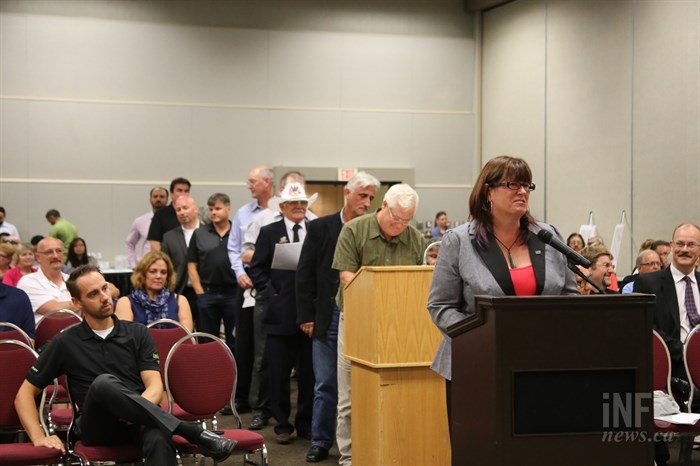
Lining up to speak at public hearings to rezone land will be harder to do under new rules the provincial government is bringing in.
(JENNIFER STAHN / iNFOnews.ca)
November 25, 2021 - 6:30 AM
The provincial government is about to limit people’s statutory right to speak up at public hearings to defend the impact on their property of new developments.
Bill 26 has passed third reading in the provincial legislature and is awaiting Royal Assent to become law next year.
For decades, it was standard practice for local governments to call public hearings for every application to rezone land.
That’s going to be flipped upside down so that, if the zoning change fits in with the Official Community Plan, it’s up to the city councils to decide if they want to call a public hearing.
“This is quite a radical change,” Kelowna’s City Clerk Stephen Fleming told his council when the changes were outlined earlier this week. “The right of the public to appear and present, if they feel their interest in land is affected, that won’t be there anymore so there’s no longer a statutory right to let council know what you think.”
When rezoning applications are filed with the city, notices will go out to neighbouring property owners before council gives the applications first reading.
Who gets notified can vary by municipality. In Kelowna it’s neighbours within 50 metres.
Residents can still contact City Hall or councillors in other ways. How that can be done still has to be worked out.
If local governments feel there is strong public concern or city staff are opposed to the rezoning, they can call public hearings. Not having a hearing will be the default position.
If the application doesn’t conform to the Official Community Plan, then a public hearing will be called.
The changes are coming after consultation with developers and local governments with the idea of making the Official Community Plans the driving force behind land use.
“What the legislation does is actually emphasize how critically important the Official Community Plan is and that the process to arrive at an OCP – which council has just gone through a multi-year process – how critical the province sees that document by saying you’ve done all the heavy lifting in the OCP, in particular in the future land use map, so the zoning that is in compliance with the OCP is more an administrative exercise because council has already put their mind to what is an appropriate land use for those areas,” Fleming said.
It’s also a tool to speed up the development process for housing. Delays at City Hall can add significant cost, making housing less affordable.
“I’ll use an example of a project near Glenmore Elementary School that council turned down,” Mayor Colin Basran said. “We turned that down because the single-family neighbourhood nearby came out en masse and said they didn’t want it.
“Imagine this playing out in every municipality across the province. You get a pretty good idea of how much housing could potentially be shut down when we desperately need it. So, the province is saying, you know what, we’re actually not going to put councils in that sort of precarious position because we know the neighbourhoods are going to push back. As a result of that, we’re going to make this process a little bit easier and, as Mr. Fleming said, put the onus on the Official Community Plan. If it’s consistent with the Official Community Plan really, there’s not a lot of reasons to go against it.”
READ MORE: Kelowna's OCP review criticized for lack of input
The same legislation will allow councils to adopt minor development variance permits without giving the public the chance to speak at a council meeting. What’s considered minor will have to be defined in a bylaw.
There have been cases in Kelowna where developers have been granted development variance permits that allowed many more storeys than permitted under the zoning rules. That would not likely be considered minor and would still allow for public input.
READ MORE: Kelowna city council approves massive downtown housing project
The legislation will also allow municipalities to advertise statutory notices differently. Right now, they have to run ads in newspapers for two consecutive weeks but the changes allow for online advertising.
A code of conduct will also have to be adopted by each council within six months after new councils are sworn in following the 2022 municipal elections.
To contact a reporter for this story, email Rob Munro or call 250-808-0143 or email the editor. You can also submit photos, videos or news tips to the newsroom and be entered to win a monthly prize draw.
We welcome your comments and opinions on our stories but play nice. We won't censor or delete comments unless they contain off-topic statements or links, unnecessary vulgarity, false facts, spam or obviously fake profiles. If you have any concerns about what you see in comments, email the editor in the link above.
News from © iNFOnews, 2021